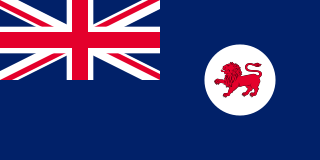
Tasmania is an island state of Australia. It is located 240 kilometres to the south of the Australian mainland, and is separated from it by the Bass Strait. The state encompasses the main island of Tasmania, the 26th-largest island in the world, and the surrounding 1000 islands. It is Australia's smallest and least populous state, with 573,479 residents as of June 2023. The state capital and largest city is Hobart, with around 40% of the population living in the Greater Hobart area. Tasmania is the most decentralised state in Australia, with the lowest proportion of its residents living within its capital city.

The Aboriginal Tasmanians are the Aboriginal people of the Australian island of Tasmania, located south of the mainland. At the time of European contact Tasmanian Aboriginals were divided into a number of distinct ethnic groups. For much of the 20th century, the Tasmanian Aboriginal people were widely, and erroneously, thought of as extinct and intentionally exterminated by white settlers. Contemporary figures (2016) for the number of people of Tasmanian Aboriginal descent vary according to the criteria used to determine this identity, ranging from 6,000 to over 23,000.
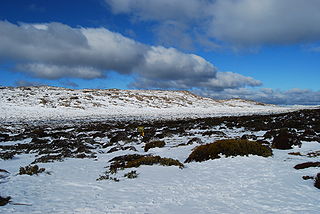
Ben Lomond is a mountain in the north-east of Tasmania, Australia.
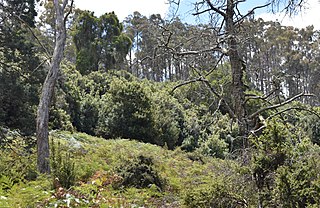
Deddington is a rural locality in the local government area (LGA) of Northern Midlands in the Central LGA region of Tasmania. The locality is about 34 kilometres (21 mi) east of the town of Longford. The 2016 census has a population of 121 for the state suburb of Deddington. The town is situated on the Nile River and lies in the foothills of Ben Lomond.

Albert Edgar Solomon was an Australian lawyer and politician. He served as premier of Tasmania from 1912 to 1914, as leader of the Liberal Party. He died of tuberculosis a few months after leaving office as premier, at the age of 38.

The North Esk River is a major perennial river located in the northern region of Tasmania, Australia.
Derek Peardon is a former Australian rules football player who played in the VFL between 1968 and 1971 for the Richmond Football Club.
The Macquarie River is a major perennial river located in the Midlands region of Tasmania, Australia.
Palawa kani is a constructed language created by the Tasmanian Aboriginal Centre as a composite Tasmanian language, based on reconstructed vocabulary from the limited accounts of the various languages once spoken by the Aboriginal people of what is now Tasmania.

Mount Barrow is a mountain in the northern region of Tasmania, Australia. With an elevation of 1,406 metres (4,613 ft) above sea level, the mountain is located 22 kilometres (14 mi) east-north-east of Launceston. The mountain habitat is a mixture of temperate old growth rainforest, subalpine and alpine landscapes.

The Aboriginal Provisional Government (APG) is an Indigenous Australian independence movement in Australia.
Norman James Brian Plomley regarded by some as one of the most respected and scholarly of Australian historians and, until his death, in Launceston, the doyen of Tasmanian Aboriginal scholarship.
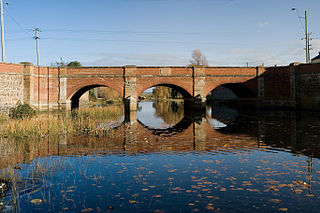
The Elizabeth River is a minor perennial river located in the Somerset Land District, in the Midlands region of Tasmania, Australia.

Bruce Pascoe is an Australian writer of literary fiction, non-fiction, poetry, essays and children's literature. As well as his own name, Pascoe has written under the pen names Murray Gray and Leopold Glass. Pascoe identifies as Aboriginal. Since August 2020, he has been Enterprise Professor in Indigenous Agriculture at the University of Melbourne.
Lucy Beeton was an Aboriginal Tasmanian schoolteacher, trader and Christian leader.
Indigenous treaties in Australia are proposed binding legal agreements between Australian governments and Australian First Nations. A treaty could recognise First Nations as distinct political communities, acknowledge Indigenous Sovereignty, set out mutually recognised rights and responsibilities or provide for some degree of self-government. As of 2023, no such treaties are in force, however the Commonwealth and all states except Western Australia have expressed support previously for a treaty process. However, the defeat of the Voice referendum has led to a reversal by several state liberal and national parties in their support for treaty and a much more ambiguous expressed position by state Labor parties and governments.
Aboriginal Australian identity, sometimes known as Aboriginality, is the perception of oneself as Aboriginal Australian, or the recognition by others of that identity. Aboriginal Australians are one of two Indigenous Australian groups of peoples, the other being Torres Strait Islanders. There has also been discussion about the use of "Indigenous" vs "Aboriginal", or more specific group names, such as Murri or Noongar (demonyms), Kaurna or Yolngu, based on language, or a clan name. Usually preference of the person(s) in question is used, if known.
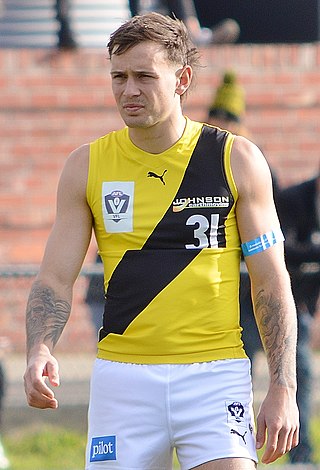
Rhyan Mansell is a professional Australian rules footballer who plays for the Richmond Football Club in the Australian Football League (AFL).

The Wybalenna Aboriginal Establishment was an internment facility built at Flinders Island by the colonial British government of Van Diemen's Land to accommodate forcibly exiled Aboriginal Tasmanians (Palawa). It was opened in 1833 and ceased operations in 1847. During that period around 180 Palawa were situated at Wybalenna with approximately 130 people dying at the establishment. Around another 25 died while being transported to the facility. The main commandant of Wybalenna was George Augustus Robinson who played a principal role in the system of capturing and sending Palawa to the facility. Famous people incarcerated at Wybalenna included Truganini, Mannalargenna and William Lanne, amongst others. Due to the many deaths of Indigenous people at Wybalenna, the alienation of the inmates from their homeland and the forcible repression of cultural practices, the Wybalenna establishment is regarded as an example of the implementation of genocidal policies against Indigenous Australians.












